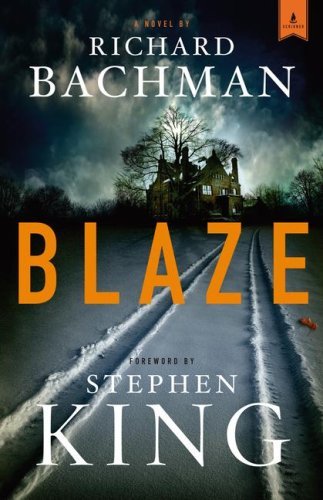
Blaze
Book Description
A desperate man on the edge of a dark abyss teams up with an innocent child in a high-stakes game of survival, where trust can be a deadly gamble. Blaze, a hulking figure with dreams of a better life, is thrust into a world of crime and betrayal, wrestling with his own demons while shielding the vulnerable boy who unwittingly holds the key to his future. As danger looms and choices grow fraught with tension, loyalty is tested and the line between right and wrong blurs. Can one flawed soul redeem himself, or is he fated to drag them both into oblivion?
Quick Book Summary
"Blaze" by Richard Bachman (a pseudonym of Stephen King) is a psychological thriller that follows Clayton Blaisdell, Jr., nicknamed Blaze, a physically imposing but mentally impaired man shaped by an abusive childhood and years in institutions. Left alone after his manipulative partner George Rackley dies, Blaze decides to carry out their last planned crime: the kidnapping of a wealthy infant. As Blaze struggles with his conscience and memories, he forms a bond with the innocent child, leading to a tense pursuit as police draw closer. Throughout the ordeal, Blaze is haunted by George’s voice, guiding—and often tormenting—him. The story explores themes of redemption, morality, and the fatal consequences of desperate choices, casting Blaze’s criminal journey in a moving, tragic light.
Summary of Key Ideas
Table of Contents
The Impact of Childhood Abuse and Trauma
Clayton Blaisdell Jr., known as Blaze, is a giant of a man with an endearing innocence but a tragic past. Abused by his father and shuffled through various institutions after a head injury left him mentally slow, Blaze is conditioned by hardship and neglect. The only true connection in his life is with George Rackley, a cunning small-time crook who takes Blaze under his wing. After George’s sudden death, Blaze is left adrift, but he clings to their last big plan: the kidnapping of infant Joe Gerard, the heir to a fortune. Blaze’s vulnerability and limited understanding of the world make him a sympathetic antihero as he embarks on this desperate crime.
Redemption Through Unlikely Bonds
Haunted by the voice of George — whether a ghost or a figment of his imagination — Blaze navigates the complex and dangerous act of caring for a child while evading law enforcement. As Blaze drives through rural Maine with the baby, George’s voice oscillates between advice, pressure, and condemnation, hinting at Blaze’s fragile mental state. Memories of his abusive upbringing surface, emphasizing how circumstance, rather than inherent evil, shaped Blaze. The kidnapping tests Blaze’s ability to make choices and resist the recurring cycles of manipulation and violence.
The Illusion of Choice in Desperate Circumstances
As days pass, Blaze’s bond with baby Joe grows deeper. For the first time, Blaze experiences real affection and a sense of responsibility. He cares for the child with clumsy but genuine tenderness—feeding him, soothing him, and keeping him warm, despite his criminal intent. This relationship brings out Blaze’s humanity and plants seeds of redemption. The suspense intensifies as the manhunt closes in, and Blaze must choose between holding onto his last hope for a better future or doing what’s morally right for the baby’s safety.
Blurred Lines Between Good and Evil
The novel explores the blurry boundaries between good and evil through Blaze’s internal struggles. While the crime itself is indefensible, the narrative humanizes Blaze, showing the immense weight of poverty, exploitation, and fate. Through shifting timelines and memories, we see Blaze’s actions as the product of neglect and desperation, complicating the reader’s judgments. The story delivers suspense through moments of close calls, tense encounters, and Blaze’s wavering resolve, keeping the stakes high until the climax.
Loneliness and the Need for Connection
In the end, “Blaze” is a tragic exploration of loneliness, the need for connection, and the possibility of redemption amidst grim circumstances. Blaze’s fleeting moment of selflessness, his forged bond with Joe, and ultimately, his doomed fate underscore both the tragedy of his life and the potential for goodness in even the most broken individuals. The novel closes on a note of ambiguity and sorrow, challenging readers to reflect on justice, empathy, and the enduring impact of a hard life.
Download This Summary
Get a free PDF of this summary instantly — no email required.





